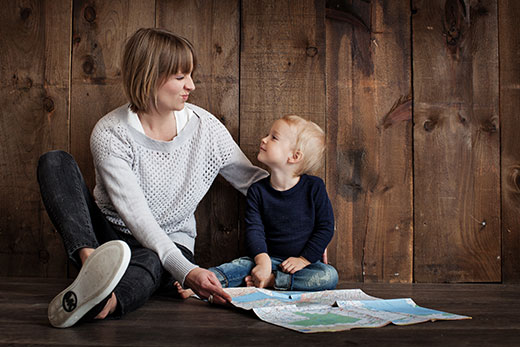
K-State child development specialist Bradford Wiles says spending quality time with children is an opportunity to build resilience.
Resilient families: K-State expert studies opportunities to build strength
Parents are role models in helping children overcome tough times
Dec. 7, 2020
MANHATTAN, Kan. – Bradford Wiles looks at some sacrifices a bit differently than others.
Staying home, avoiding crowds, wearing a mask… For many, he says, “you’re just doing the right things.”
“But for me as a researcher in this area,” said Wiles, a child development specialist with K-State Research and Extension, “what I think about is that you’re building resilience.”
Listen to an interview by Jeff Wichman with Bradford Wiles on the weekly radio show, Sound Living
He said it doesn’t require a global pandemic for people to become more resilient, which some may think of as ‘toughness,’ or having the capacity to recover quickly from difficulties. In more normal times, parents are routinely preparing their children for the world ahead of them.
“Keep in mind that resilience is not a temporary state,” Wiles said. “Resilience is part of every family. It’s a process that is taking place in families and communities all the time.
“One of the most important ways parents encourage resilience is by spending quality time interacting with their children, even when they’re very young. I particularly advocate reading with children, but also playing with them. Telling stories and spending time together builds a relationship so that when things get challenging as the kids get older, there’s a secure base for them to be able to reference and work from.”
Wiles leads the team in the K-State laboratory, Applied Research in Child Health and Enhancing Resilience, known as ARCHER, which studies factors that build health and resilience in vulnerable families and children.
He called the current pandemic, “the most challenging time of my lifetime. There is a real opportunity for building resiliency and practicing it.”
“Resilience is both a product and a process,” Wiles said. “It’s something that can result (after) the pandemic, for example, but it’s also a product that is generated during the pandemic.”
Thus, the lessons learned and sacrifices made are not solely to get past a difficult time. For parents, it’s part of helping children understand that they have the strength – the resilience – to handle tough times in their own lives.
“I think it’s important to say to parents that they are not going to be perfect in helping their children learn these lessons, and nobody expects them to be perfect,” Wiles said. “One of the biggest elements of all this is forgiving ourselves for the mistakes we make.”
“But we are role models, and we are the people who children are looking to for guidance on how to manage things, how to handle our emotions, how to handle relationships and how to handle extreme stress; and even minor things like how to handle wearing a mask, where we go and how long we choose to visit with people.”
Wiles said the pandemic is one of the times in our lives that represents an opportunity to be good role models for children.
“When this pandemic is over, parents likely will never spend the same amount of time with their children again,” he said. “While it’s difficult now, it’s also an opportunity to really invest ourselves in our children and make them feel a part of us in ways that we simply couldn’t do before because we were going about our daily lives outside of the home.”
Resilience, he said, also is built in more simple ways, such as parents’ enforcing safe hygiene and health practices, or even playing a board game as a family.
“It may seem to you like that’s just playing a game,” Wiles said, “but that activity is an element of building resilience. When you talk to your children about family resources – time, money and talent – you’re not setting out to say, ‘okay I’m going to build resilience.’ You might be that direct, but generally that’s not how we operate. Rather, you’re thinking that you’re teaching your kids about the value of a dollar. That’s building resilience.”
Wiles said building resilience often takes a lot of time: “And further, it’s not just about money. There are plenty of people who have lots of money who are still quite vulnerable. Resilience is a process that acts across all socio-economic statuses; everybody, regardless of their financial status, is subject to risk. Being mindful to how resilience is built in families is critical.”
More information about resilience and child development is available online from K-State Research and Extension.

